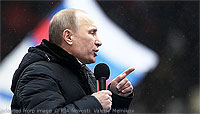Putin leans towards fiscal austerity
Natasha Doff - Moscow News - themoscownews.com - 4.19.12 - JRL 2012-72
As a divide deepens between fiscal policymakers over how to stabilize Russia's troubled finances, President-elect Vladimir Putin sought to settle matters Tuesday by giving the nod to the austerity camp.

file photoSpeaking at a meeting with Finance Ministry officials, Putin ruled out running a budget deficit to stimulate economic diversification and praised the fiscal conservative policies of former Finance Minister Alexei Kudrin.
"By 2015 we need finally and firmly to achieve a deficit-free budget," Putin said.
The remark comes in response to a proposal from the Economic Development Ministry last week for Russia to run a budget deficit of 1-1.5 percent over several years in order to modernize the economy and boost economic growth in the long-run.

file photoRussia is currently forecast to run a budget deficit of 1.5 percent of gross domestic product this year, with a rise to 1.6 percent in 2013 and a drop to 0.7 percent in 2014.
Deepening divide
This Economic Ministry's approach has long been criticized by the Finance Ministry, which envisages a return to the fiscal austerity policies and low debt maintained before the 2008-2009 financial crisis.
Since the crisis, Russia's non-oil deficit has swelled to 10 percent of GDP due to increased expenditures, and the oil price at which the country balances its budget has jumped to $115 per barrel, from just $40 less than five years ago.
The Finance Ministry has advocated a policy of tying government expenditures to the average oil price over the previous 10 years in order to straighten out the country's finances.
While Putin has given no concrete endorsement or rejection of either policy - and the annual budget review process is not due until after the new cabinet is formed in early June - his comments Tuesday would suggest that he is leaning strongly towards the Finance Ministry strategy.
Meeting spending commitments
The rift between the ministries comes as fiscal policymakers struggle to meet the raft of spending commitments outlined by Putin in his pre-election campaign, while also stabilizing government finances and seeking to wean the economy off its dependence on oil and gas.
Analysts have estimated the size of the spending commitments at between 1.5 percent and 5 percent of GDP.
Putin pointed on Tuesday to the gas sector as a source of tax revenue to fund both his spending commitments and the budget deficit.
"We have sectors where a low tax burden is not economically justified and is not very just from the social point of view. I am speaking, first of all, about incomplete subtraction of rents on mineral extraction," Putin told the Finance Ministry.
Russia's gas sector has traditionally been subject to lower taxes than the country's oil companies, which act as the key source of state budget revenues. But this changed at the beginning of the year when the government more than doubled its mineral extraction tax for Gazprom.
Investors wary
While Putin made it clear that he was talking primarily about taxation on the gas sector, analysts said investors are wary of it extending to other sectors.
"The prospect of extra taxation across the metals and mining sectors is one of the reasons why investors are wary of that theme [taxation] and will justifiably remain so until we get some clarity on whether there will be a tax increase and by how much," Chris Weafer, strategist at Troika Dialog investment bank said in a research note Wednesday.
Alfabank economist Natalia Orlova described Putin's apparent endorsement of fiscal austerity as "positive for budget discipline, but negative for growth prospects."
"Increasing dependence on the commodities sector is one of the reasons why Russia is capital outflows and this risk is still on the agenda," Orlova told The Moscow News. "But given the global instability and volatility of financial markets, accumulating debt burden would be a high-risk policy, even for a state which is currently running a low debt to GDP ratio."
Keywords: Russia, Government - Russia, Economy, Budget - Russia, Media, Internet - Russian News - Russia
As a divide deepens between fiscal policymakers over how to stabilize Russia's troubled finances, President-elect Vladimir Putin sought to settle matters Tuesday by giving the nod to the austerity camp.

file photoSpeaking at a meeting with Finance Ministry officials, Putin ruled out running a budget deficit to stimulate economic diversification and praised the fiscal conservative policies of former Finance Minister Alexei Kudrin.
"By 2015 we need finally and firmly to achieve a deficit-free budget," Putin said.
The remark comes in response to a proposal from the Economic Development Ministry last week for Russia to run a budget deficit of 1-1.5 percent over several years in order to modernize the economy and boost economic growth in the long-run.

file photoRussia is currently forecast to run a budget deficit of 1.5 percent of gross domestic product this year, with a rise to 1.6 percent in 2013 and a drop to 0.7 percent in 2014.
Deepening divide
This Economic Ministry's approach has long been criticized by the Finance Ministry, which envisages a return to the fiscal austerity policies and low debt maintained before the 2008-2009 financial crisis.
Since the crisis, Russia's non-oil deficit has swelled to 10 percent of GDP due to increased expenditures, and the oil price at which the country balances its budget has jumped to $115 per barrel, from just $40 less than five years ago.
The Finance Ministry has advocated a policy of tying government expenditures to the average oil price over the previous 10 years in order to straighten out the country's finances.
While Putin has given no concrete endorsement or rejection of either policy - and the annual budget review process is not due until after the new cabinet is formed in early June - his comments Tuesday would suggest that he is leaning strongly towards the Finance Ministry strategy.
Meeting spending commitments
The rift between the ministries comes as fiscal policymakers struggle to meet the raft of spending commitments outlined by Putin in his pre-election campaign, while also stabilizing government finances and seeking to wean the economy off its dependence on oil and gas.
Analysts have estimated the size of the spending commitments at between 1.5 percent and 5 percent of GDP.
Putin pointed on Tuesday to the gas sector as a source of tax revenue to fund both his spending commitments and the budget deficit.
"We have sectors where a low tax burden is not economically justified and is not very just from the social point of view. I am speaking, first of all, about incomplete subtraction of rents on mineral extraction," Putin told the Finance Ministry.
Russia's gas sector has traditionally been subject to lower taxes than the country's oil companies, which act as the key source of state budget revenues. But this changed at the beginning of the year when the government more than doubled its mineral extraction tax for Gazprom.
Investors wary
While Putin made it clear that he was talking primarily about taxation on the gas sector, analysts said investors are wary of it extending to other sectors.
"The prospect of extra taxation across the metals and mining sectors is one of the reasons why investors are wary of that theme [taxation] and will justifiably remain so until we get some clarity on whether there will be a tax increase and by how much," Chris Weafer, strategist at Troika Dialog investment bank said in a research note Wednesday.
Alfabank economist Natalia Orlova described Putin's apparent endorsement of fiscal austerity as "positive for budget discipline, but negative for growth prospects."
"Increasing dependence on the commodities sector is one of the reasons why Russia is capital outflows and this risk is still on the agenda," Orlova told The Moscow News. "But given the global instability and volatility of financial markets, accumulating debt burden would be a high-risk policy, even for a state which is currently running a low debt to GDP ratio."